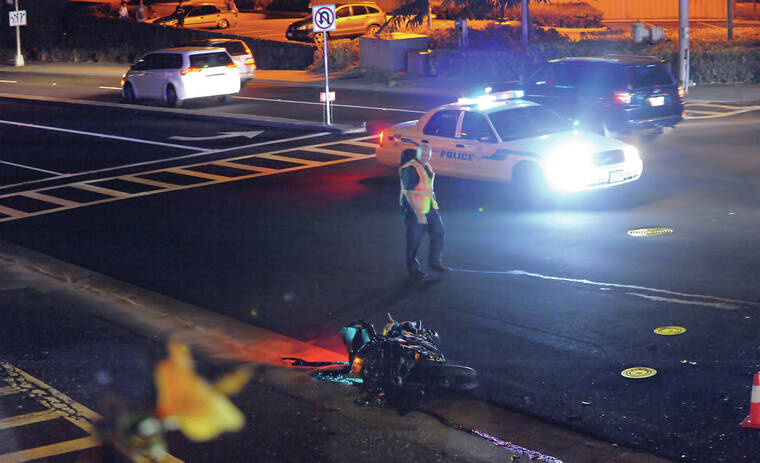A measure that would impose a stiffer penalty on a person convicted of first-degree negligent homicide while driving under the influence of an intoxicant passed its only committee hearing Friday.
Senate Bill 2163 would elevate first-degree negligent homicide to a Class A felony — which is punishable by up to 20 years behind bars — if the person has a prior DUI conviction within 20 years of the negligent homicide offense; is driving with a license revoked or suspended for drunken driving; or is a “highly intoxicated driver,” which means having a blood alcohol concentration of 0.15% — nearly twice the legal limit of 0.08%.
Currently, a person convicted of first-degree negligent homicide, a Class B felony, faces up to 10 years imprisonment.
Hawaii County Prosecuting Attorney Kelden Waltjen, offering testimony in support of the measure, stated the aggravating factors outlined in the measure “demonstrate the defendant was acting with disregard to the safety and lives of others on the road.”
“These factors justify the possibility of a longer term of imprisonment,” he said in written testimony.
Waltjen also noted that while a prosecutor can elect to charge a defendant with manslaughter, which is a Class A felony, the state must prove the defendant acted recklessly as opposed to the lower threshold of negligence required to prove an offense first-degree negligent homicide.
“SB 2163 serves to strengthen Hawaii’s laws against drunk drivers who have no excuse to put others in harm’s way. By creating a set of aggravating factors within the charge of §702-702.5, Negligent Homicide in the First Degree, Defendant’s will be exposed to a proper level of punishment for inexcusable actions that resulted in devastating consequences,” Waltjen offered in testimony.
Hawaii Police Department Chief Paul Ferreira also testified in support of the measure, stating that the majority of fatal crashes in Hawaii involve drivers impaired by intoxicating substances.
“In 2021, Hawaii County had 26 people who were killed in fatal crashes, 21 of them involved an impaired driver, which equates to one person being killed every 17 days,” Ferreira said. “Many of the most tragic crashes involve drivers who were highly intoxicated at that time.”
MADD Hawaii said the state has for too long treated “impaired drivers who kill people on our roadways far too lenient.”
“These increased punishments are long overdue and just part of the effort to provide a strong deterrence to drive while impaired and finally, appropriately punishes those offenders involved in fatal crashes,” said Kurt Kendro, Mothers Against Drunk Driving (MADD) Hawaii’s Public Policy Committee chairperson.
The Senate Committee on Judiciary voted 7-0 to pass the measure without amendments. It next heads to the Senate floor for a full vote to continue its journey this legislative session.
Also Friday, the same committee voted 5-2 to pass with amendments Senate Bill 2096, which would lower the threshold of blood-alcohol concentration for being arrested and charged with driving under the influence of an intoxicant from the current 0.08% to 0.05%.
According to the National Transportation Safety Board, lowering the rate would save approximately 500 to 800 lives each year.
According to the state Department of Transportation, more than 19,470 people were arrested for suspected DUI between 2017 and 2021. Of those arrested, 878 individuals, or 5%, had a BAC between .05 and .079.
If enacted, the measure will make Hawaii only the second state in the nation to lower the threshold, following Utah’s move in 2018. A recent report by the National Highway Transportation Safety Administration (NHTSA) found a 19.8% drop in fatal car crashes in the 21-month period following the passage of Utah’s law.
The NTSB recommends all 50 states lower the threshold to 0.05.
Of the 31 written testimonies received, three opposed the measure. Submitting testimony in opposition to SB 2096 was American Beverage Institute, the Wine Institute and the State Office of the Public Defender.
“We all want to save lives and I applaud the committee for investigating the topic. But attacking moderate consumers in order to get at product abusers with a new law targets the responsible people for suffering in an unjust legal system. There is a reason no other state beyond Utah has employed this attack on alcohol. Hawaii should also continue using their resources to reduce abusive drinking prior to driving.Utah is the only state that currently sets the threshold at .05,” wrote American Beverage Institute Executive Director Richard Berman.
SB 2096 next heads to the Senate floor for a full vote to continue its journey this legislative session.
A companion bill, House Bill 1437, has yet to secure a hearing before the House Committee on Judiciary and Hawaiian Affairs.






